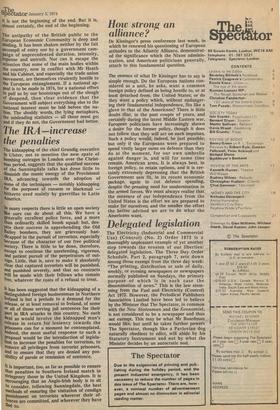How strong an alliance?
Dr Kissinger's press conference last week, in which he renewed his questioning of European attitudes to the Atlantic Alliance, demonstrated the significance which the Nixon administration, and American politicians generally, attach to this fundamental question.
The essence of what Dr Kissinger has to say is simple enough. Do the European nations con sidered as a unit, he asks, want a common foreign policy defined as being hostile to, or at least detached from, the United States; or do they want a policy which, without endangering their fundamental independence, fits like a glove to that of the Americans? There is little doubt that, in the past couple of years, and certainly during the latest Middle Eastern war, European politicians have increasingly shown a desire for the former policy, though it does not follow that they will act on such impulses. Such a policy would, indeed, be just possible; but only if the Europeans were prepared to spend vastly larger sums on defence than they do at the moment, for our own umbrella against danger is, and will for some time remain, American arms. It is always best, in foreign policy, to retain options, and it is certainly extremely depressing that the British Government saw fit, in its recent economic package, again to cut defence spending, despite the pressing need for modernisation in the armed forces. We must always realise that the measure of our independence from the United States is the effort we are prepared to make for ourselves; and the smaller the effort the better advised we are to do what the Americans want.
Delegated leg's' lation
The Electricity (Industrial and Commercial Use) (Control) (No. 2) Order 1973 is a thoroughly unpleasant example of yet another step towards the erosion of our liberties: delegated legislation. The Three Day Order Schedule, Part 2, paragraph 7, sets down among those exempt from the three day week: "The printing, distribution or sale of daily, weekly, or evening newspapers or newspapers normally published on Sundays, the primary purpose of which is in each case the dissemination of news." This is the law stemming from the Fuel and Electricity (Control) Act 1973. However, the Periodical Publishers Association Limited have been led to believe by the Minister that The Spectator, in common with the New Statesman and the Economist, is not considered to be a newspaper and thus not exempt. This may be what Mr Boardman would like, but until he takes further powers The Spectator, though like a Pavlovian dog naturally obedient to edict, will abide by his Statutory Instrument and not by what the Minister decides by an autocratic nod.


























 Previous page
Previous page